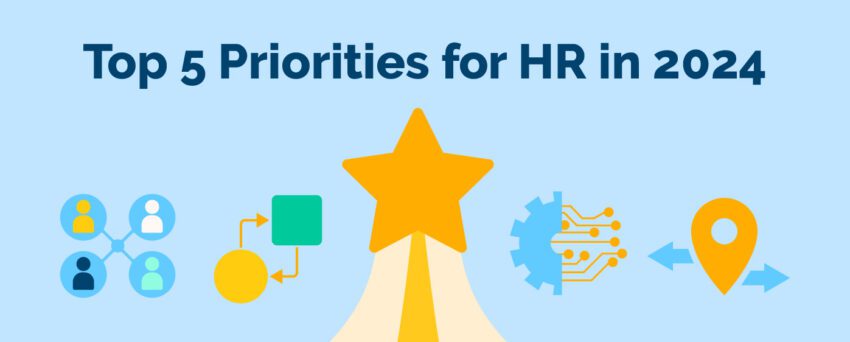01Apr 2024
The way we operate businesses is constantly changing, and the human resources (HR) industry for 2024 is poised to pose new priorities, challenges, and opportunities for organizations.
Human resources professionals are tasked with the complex challenge of balancing the needs of both an organization and its employees. With the acceleration of technology, the evolving nature of work, and the growing emphasis on employee well-being, HR leaders must re-examine their priorities to meet the dynamic demands of the workplace today and for years to come.
According to the research experts at Gartner, there are five top HR priorities to focus on in 2024 that we’ll help you dive into:
1. Leader and Manager Effectiveness
 Strong managers are foundational to a successful organization. Ironically, 76 percent of HR leaders say their managers are overwhelmed by the growth of their job responsibilities. HR experts therefore must re-evaluate the job expectations of their managers and remove the obstacles and challenges hindering their workflow. HR should help leaders become managers of tasks, along with coaches and stewards of talent.
Strong managers are foundational to a successful organization. Ironically, 76 percent of HR leaders say their managers are overwhelmed by the growth of their job responsibilities. HR experts therefore must re-evaluate the job expectations of their managers and remove the obstacles and challenges hindering their workflow. HR should help leaders become managers of tasks, along with coaches and stewards of talent.
The Value of Office Engagement
While remote and hybrid work models have become more common in the modern workplace, the value of traditional in-office work settings should not be overstated. By cultivating a workspace that encourages direct interaction, companies ensure their team benefits from instant communication and a cohesive work environment.
HR departments in these types of work settings should focus on enhancing the office environment to boost productivity, collaboration, and employee engagement. Implementing policies that strengthen the office work culture involves HR professionals developing initiatives that promote a vibrant office atmosphere — one that motivates managers to lead with an emphasis on face-to-face communication and teamwork.
In remote and hybrid settings, HR departments need to refine their work policies to address concerns regarding productivity, collaboration, and engagement. Policies need to be clear, comprehensive, and customizable to individual and team needs, enabling employees to deliver their best performance regardless of location.
2. Organizational Culture
 Nurturing a culture of trust, accountability, and transparency is pivotal in ensuring that your workforce has a united and cohesive culture that propels the company toward its goals. HR should thus champion flexible working arrangements that are not just a perk but a necessity in the modern workplace.
Nurturing a culture of trust, accountability, and transparency is pivotal in ensuring that your workforce has a united and cohesive culture that propels the company toward its goals. HR should thus champion flexible working arrangements that are not just a perk but a necessity in the modern workplace.
Building a Remote and Hybrid Culture
While the intrinsic value of face-to-face collaboration and spontaneous interactions helps build a more connected and engaged work environment, cultivating a company culture that transcends physical space is imperative. HR will play a crucial role in this development by introducing initiatives that foster a sense of belonging, and maintain the same level of organizational purpose and values among remote workers as their in-office colleagues.
Virtual team-building exercises, digital shoutouts for successes, and company-wide live-streamed events may become more commonplace examples of building a connected culture. When considering remote and hybrid work policies, HR professionals are required to design equitable remote policies that foster a sense of connectedness — while also training managers to lead teams across physical and digital divides.
Diversity, Equity, and Inclusion
Businesses must move beyond checkboxes to truly cultivate a diverse, equitable, and inclusive workplace. HR continues to play a pivotal role in driving these initiatives and holding organizations accountable.
3. HR Technology
 Incorporating the latest in HR tech innovations is an important facet of the modern workplace. AI-powered recruitment, virtual onboarding, and sophisticated performance management platforms have now become the standard tools of the trade in HR.
Incorporating the latest in HR tech innovations is an important facet of the modern workplace. AI-powered recruitment, virtual onboarding, and sophisticated performance management platforms have now become the standard tools of the trade in HR.
Artificial Intelligence (AI) and Machine Learning
The infusion of AI and machine learning in HR technology will continue to shape the industry. As much as 64 percent of business owners believe AI can improve overall business productivity. The automation of administrative tasks, predictive analytics in recruitment and retention, and customized learning and development plans, for example, are just some of the advancements we can anticipate.
Allowing HR professionals to shift focus to more strategic and value-driven activities that directly impact business is a game-changer for entities in this day and age. HR professionals must understand and leverage these innovations to drive efficiency and make informed decisions.
Data Security
Data security will be a top priority with the increase in digital HR platforms. HR departments will not only need to ensure that employee data is protected but also that their tech complies with global data protection regulations. Regular security audits and continuous updates to privacy policies also will continue to be essential.
Remote Work and Compliance
Adhering to labor laws and tax regulations across varying jurisdictions adds complexity to HR’s responsibilities in a remote work environment. Standardizing practices that comply with regional and international laws will be paramount for HR in 2024 — policies such as understanding different employment laws, data protection regulations, and tax implications associated with remote employees.
4. Change Management
 Effective change management processes are the guardrails that prevent organizational chaos. HR must lead the charge in facilitating smooth transitions and removing the fears of an unsettled workforce. Effective communication is vital; clear and consistent communication is the core of any change management effort. HR must ensure messages are broadcast, received, and taken action across all levels of an organization.
Effective change management processes are the guardrails that prevent organizational chaos. HR must lead the charge in facilitating smooth transitions and removing the fears of an unsettled workforce. Effective communication is vital; clear and consistent communication is the core of any change management effort. HR must ensure messages are broadcast, received, and taken action across all levels of an organization.
5. Career Management and Internal Mobility
 Internal mobility programs provide a pathway for employees to grow within an organization. HR must champion a culture of continuous learning, making professional development opportunities available and ingrained in the culture.
Internal mobility programs provide a pathway for employees to grow within an organization. HR must champion a culture of continuous learning, making professional development opportunities available and ingrained in the culture.
So what should HR be focused on in 2024?
-
Enhancing Employee Experience
Innovative HR technology will revolutionize the employee experience by providing seamless onboarding processes, real-time feedback systems, and personal career development pathways. By integrating these technologies, HR can create a more engaging and personalized experience for each employee.
Crafting an exceptional employee experience is a competitive advantage that pays dividends in engagement, satisfaction, and ultimately the bottom line. HR is on the frontlines of experience design.
-
Employee Well-Being
The importance of a comprehensive employee well-being program has never been more prominent. In the wake of the pandemic, mental and emotional health support systems have emerged as a critical HR priority. Mental health initiatives, physical wellness, and support systems are economic imperatives that bolster productivity and reduce turnover. These initiatives need to be ongoing and responsive to the unique needs of a diverse workforce.
-
A Holistic Health Approach
The concept of “well-being” has transcended mere physical health. HR will increasingly consider mental, financial, and emotional health within their strategies. Initiatives such as in-house counseling, financial planning assistance, and flexible schedules will become standard as companies look to support their employees wholly.
-
Employee Assistance Programs (EAPs)
Employee assistance programs that are tailored to meet the diverse needs of the workforce are becoming indispensable. By providing resources for mental health, addiction recovery, legal aid, or family services, HR is acknowledging that supporting an employee’s life inside and outside of work is vital to their overall productivity and satisfaction at work.
-
A Push for Work-Life Harmony
The balance between work and personal life has always been a concern, but now there is a shift toward work-life harmony. HR is tasked with creating policies that allow for life’s unexpected moments without compromising work quality. This includes considering options like job sharing, compressed workweeks, and extended parental leave.
Navigating the Future of HR
Navigating the intricacies of remote and hybrid work policies, harnessing HR tech innovations, and prioritizing employee well-being are pivotal to instilling a positive work culture. The future of work is a complex, multi-faceted landscape that is evolving at record speed.
HR professionals in 2024 will need to be agile, and have a progressive mindset to stay aligned with the rapid changes of the workplace. Whether crafting flexible remote work policies, integrating impactful HR tech innovations, or supporting the all-encompassing well-being of employees, the time for planning and action is now. Prioritize these areas and your HR department can lead the way in building resilient organizations poised for success in an uncertain future.
While these top five HR priorities offer a framework to steer strategies in the right direction, the most successful HR executives will keep their fingers firmly on the pulse of emerging HR trends — adapting and evolving with the times. The human aspect of human resources remains the core around which these priorities revolve, even as we move further into the digital age.
Reach out to our team at DOCUdavit today! We’ll help you discover what we can do to automate your document scanning, storage, and management process.

